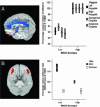Neural mechanisms of genetic risk for impulsivity and violence in humans
- PMID: 16569698
- PMCID: PMC1458867
- DOI: 10.1073/pnas.0511311103
Neural mechanisms of genetic risk for impulsivity and violence in humans
Abstract
Neurobiological factors contributing to violence in humans remain poorly understood. One approach to this question is examining allelic variation in the X-linked monoamine oxidase A (MAOA) gene, previously associated with impulsive aggression in animals and humans. Here, we have studied the impact of a common functional polymorphism in MAOA on brain structure and function assessed with MRI in a large sample of healthy human volunteers. We show that the low expression variant, associated with increased risk of violent behavior, predicted pronounced limbic volume reductions and hyperresponsive amygdala during emotional arousal, with diminished reactivity of regulatory prefrontal regions, compared with the high expression allele. In men, the low expression allele is also associated with changes in orbitofrontal volume, amygdala and hippocampus hyperreactivity during aversive recall, and impaired cingulate activation during cognitive inhibition. Our data identify differences in limbic circuitry for emotion regulation and cognitive control that may be involved in the association of MAOA with impulsive aggression, suggest neural systems-level effects of X-inactivation in human brain, and point toward potential targets for a biological approach toward violence.
Conflict of interest statement
Conflict of interest statement: No conflicts declared.
Figures




Comment in
-
Genes for susceptibility to violence lurk in the brain.Proc Natl Acad Sci U S A. 2006 Apr 18;103(16):6085-6. doi: 10.1073/pnas.0601350103. Epub 2006 Apr 10. Proc Natl Acad Sci U S A. 2006. PMID: 16606856 Free PMC article. No abstract available.
References
Publication types
MeSH terms
Substances
Grants and funding
LinkOut - more resources
Full Text Sources
Other Literature Sources
Medical

